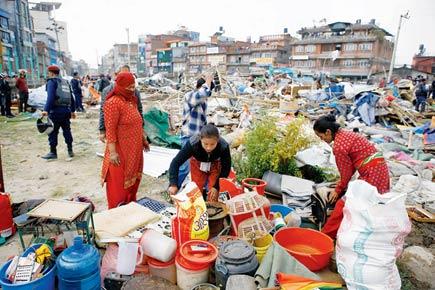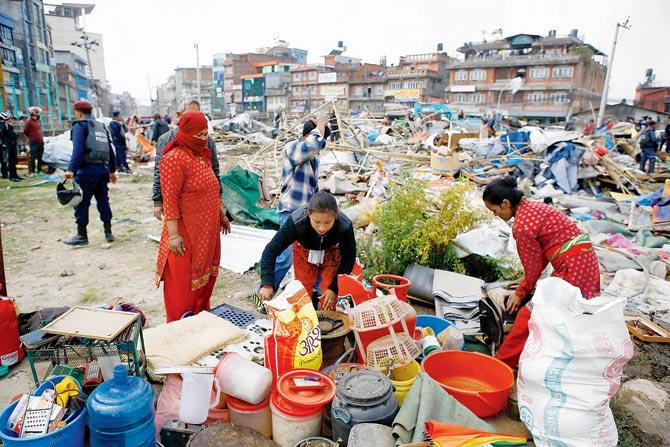India is not a generous neighbour, even to countries like Nepal, whose people love PM Modi and desperately need our help


Victims of the 2015 earthquake gather their belongings, rendered homeless a second time after the Kathmandu police on March 14, 2017, demolished the largest settlement camp where 100 displaced families were staying. Pic/AFP
 On a visit to Kathmandu last week I met the interesting 81-year-old recently retired surgeon, Dr Sudip Bhattacharya. Though ethnically Bengali, his family has lived in Nepal for four centuries. His childhood schooling was in Bihar, in the Darbhanga twin-city of Laheria Sarai, where my paternal grandparents had a house when they left our village in 1955; he attended Zila school (the district school was then called North Brook Zila school) though he attended medical school in UP. He then went to the United Kingdom to be a Fellow of the Royal College of Physicians, but in 1967, returned to Nepal to work in Biratnagar (Nepal's second largest city, six kilometres north of the Bihar border). There was much in common with my 81-year-old father, who attended Darbhanga Medical College and migrated to the UK to be a Member of the Royal College of Physicians that I felt a pang of remorse: Dr Bhattacharya's three children had also become doctors. How disappointed my father must be.
On a visit to Kathmandu last week I met the interesting 81-year-old recently retired surgeon, Dr Sudip Bhattacharya. Though ethnically Bengali, his family has lived in Nepal for four centuries. His childhood schooling was in Bihar, in the Darbhanga twin-city of Laheria Sarai, where my paternal grandparents had a house when they left our village in 1955; he attended Zila school (the district school was then called North Brook Zila school) though he attended medical school in UP. He then went to the United Kingdom to be a Fellow of the Royal College of Physicians, but in 1967, returned to Nepal to work in Biratnagar (Nepal's second largest city, six kilometres north of the Bihar border). There was much in common with my 81-year-old father, who attended Darbhanga Medical College and migrated to the UK to be a Member of the Royal College of Physicians that I felt a pang of remorse: Dr Bhattacharya's three children had also become doctors. How disappointed my father must be.
ADVERTISEMENT
Dr Bhattacharya met his wife in Bihar - her parents, both graduates of Dhaka Medical College, and her grandfather, an anti-British rebel in Chittagram (now Chittagong) and Burma, had fled East Pakistan (now Bangladesh) during Partition. They lived in Purnea when Dr Bhattacharya met his future wife.
Dr Bhattacharya is an RSS sympathiser. He said that on August 15, 1947, he was one of five people selected to sing the national anthem at Laheria Sarai's Polo Ground, in front of tens of thousands of the newly independent. He added that after Gandhiji's assassination (on January 30, 1948), the police came and pulled his teacher out of the classroom for suspected RSS sympathies. "I love Modi," Dr Bhattacharya declared, about the Indian prime minister.
In January, Dr Bhattacharya and his wife were in Kolkata, where branches of their extended family live. The couple had returned from a four-month trip to the US where their younger daughter is a doctor in California and their son a surgeon in Illinois. They had with them Rs 52,000 in recently-demonetised Indian currency. This is legitimate as you are allowed to bring Rs 25,000 into Nepal. They went to the RBI counter - reaching it was in itself a Calcuttan Kafkaesque adventure - and submitted the currency for exchange into new notes. The RBI teller asked why they had waited so long to deposit the money. They told them why. The teller demanded their passports. Dr and Mrs Bhattacharya showed their passports. The teller shook his head and turned them away. The Bhattacharyas held Nepalese passports.
They left the RBI office bemoaning their fate and were immediately greeted by a tout. I'll exchange the notes for you, he offered, but I will keep 80 per cent of the value.
Dr Bhattacharya irritatably said, only if you reverse the ratio (meaning the elderly couple would keep 80 per cent of the value); otherwise he would rather throw his demonetised currency into the Ganga river. The tout declined. The Bhattacharyas returned to Kathmandu with their old currency.
While I was in Kathmandu, the Nepal Rashtra Bank and the Reserve Bank of India held a two-day meeting to sort out the money exchange issues for Nepal's citizens. Remember, India allows only Rs 4,500 of currency to be exchanged. The RBI would not budge on the NRB's request to raise the limit to Rs 25,000 for its citizens, in line with the cross-border currency allowance. It seemed like a reasonable request, but obviously not to the RBI. Also, the NRB wanted a month's notice for the currency exchange, but the RBI stuck to its guns for a two-day notice and a five-day window for exchange. Additionally, the NRB wanted Indian banks near border towns like Biratnagar to be allowed for the currency exchange, but the RBI said no. Dr Bhattacharya is stuck with his notes till the exchange is announced. I do hope he finds a way to get rid of the rest of the now illegal notes.
This demonetisation intransigence is just another example of Indian cussedness when it comes to dealing with its neighbour, Nepal. Kathmandu is a shabby, smoke-filled small town, bursting at the seams with a population of 40 lakh, and there is constantly a sheet of dust in the air (perhaps a consequence of the massive April 2015 earthquake) on the roads, even in spring, even at midday. Almost every Nepali pedestrian you see wears a face mask. It is an impoverished city. Human trafficking is worse than ever, and even before the earthquake it was a national crisis. I don't know why India, which keeps talking of global power and rocketing GDP, can't help pull Nepal into the middle-class. India is not a generous Big Brother. Even to countries which are filled with the likes of Dr Bhattacharya, who love Modi.
Aditya Sinha's crime novel, The CEO Who Lost His Head, is out later this month. He tweets @autumnshade Send your feedback to mailbag@mid-day.com
 Subscribe today by clicking the link and stay updated with the latest news!" Click here!
Subscribe today by clicking the link and stay updated with the latest news!" Click here!







